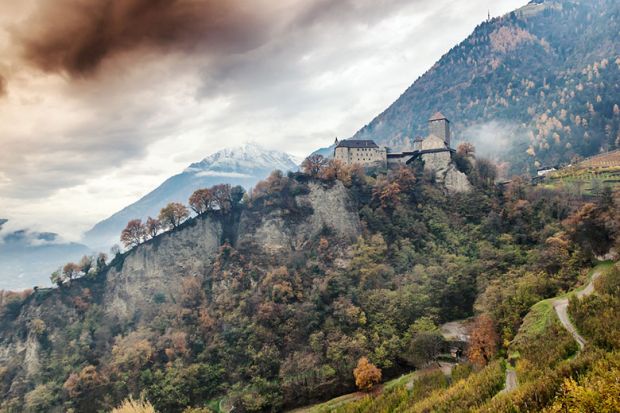The South Tyrol, formerly part of the Austro-Hungarian Empire, was given to Italy by the Allies in 1919 in recognition of its contribution to the defeat of Germany in the First World War. Many Austrian and German nationalists never accepted the loss of the area, yet in 1939 Hitler and Mussolini came to an agreement that South Tyrol would remain with Italy. The Germans living there, some 250,000, were to be given the chance of resettlement in the Reich. In practice, only about 80,000 were resettled. Germany and Italy came to a similar agreement about the Gottschee region after the conquest of Yugoslavia in 1941. Gottschee (today part of Slovenia) fell to Italy, and the Germans living there were to be “brought home”.
Between 1939 and 1943, therefore, cultural commissions set up under Himmler’s SS-Ahnenerbe (SS Ancestral Inheritance) carried out extensive fieldwork in the South Tyrol and Gottschee. The idea was to investigate the areas’ Germanic folklore, songs, dances, customs and vernacular architecture. James Dow’s book follows the biographies and ideas of those pseudoscientific scholars and other crackpots who were convinced that the history of the world was really the history of the Nordic-Germanic race.
When Austrian engineer Hanns Hörbiger – of Tyrolean descent – came up with the so-called World Ice Theory, this was enthusiastically embraced by Nazis such as Himmler: Nordic man, so ran the claim, had grown strong in ice and snow. The members of Himmler’s cultural commissions clearly believed that it was in Tyrol and Gottschee that Nordic-Germanic traditions had been most purely preserved. But the fieldwork that the commissions carried out was not designed merely to record them.
As Dow shows through extensive use of archive material, the results of the commissions’ work were to inform cultural policy among the Tyrolean and Gottschee Germans after their resettlement. It was not just they who were to be moved, but the whole Nordic-Germanic heritage that they supposedly embodied. This heritage included the contents of museums, statues, artworks and other property defined by the commissions as “Germanic”. When the Nazis tried to transport this to the Reich, they met with the resistance of Italian authorities, who, not surprisingly, regarded much of the targeted material as “Romance” in origin and character. How much was actually carted off is unclear from Dow’s book. The “programmed plunder” of the subtitle does not seem to have been implemented systematically, any more than the resettlement was. When it was carried out, the results were sometimes comical. Whole houses in Gottschee were dismantled and transported to Lower Styria. When they arrived, no one knew what they were for, so they ended up as firewood.
Dow describes the fieldwork and its consequences as an “unparalleled occurrence”, but sadly offers few comparisons with the activities of the Nazi heritage plunderers in other parts of Europe. The archive material, which includes telling photographs, is fascinating, but at times the argument gets submerged in the detail (particularly the biographies of the commissions’ members). Overall, though, Dow has an intriguing story to tell, and provides an engaging and well-informed account.
Bill Niven is professor of contemporary German history at Nottingham Trent University and the author of Hitler and Film: The Führer’s Secret Passion (2018).
Heinrich Himmler’s Cultural Commissions: Programmed Plunder in Italy and Yugoslavia
By James R. Dow
University of Wisconsin Press
208pp, £76.95
ISBN 9780299316501
Published 30 April 2018
POSTSCRIPT:
Print headline: A quest to bottle German heritage
Register to continue
Why register?
- Registration is free and only takes a moment
- Once registered, you can read 3 articles a month
- Sign up for our newsletter
Subscribe
Or subscribe for unlimited access to:
- Unlimited access to news, views, insights & reviews
- Digital editions
- Digital access to THE’s university and college rankings analysis
Already registered or a current subscriber? Login







